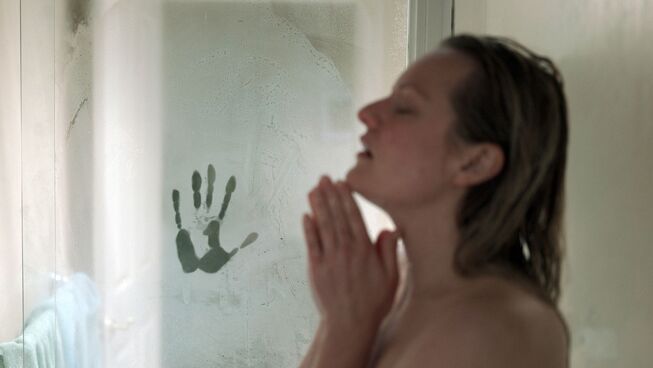Shirley

3.5 out of 5 stars
Josephine Decker’s 2020 film Shirley has been labelled an unconventional biopic, a gothic drama, a literary psychodrama. What most reviewers agree on, though, is that this isn’t a typical biopic. It is a story based on the life of American horror and mystery novelist, Shirley Jackson (convincingly played by Elisabeth Moss), fictionalised, highly stylised, and told in the manner of one of her stories. Don’t be put off by the trailer, which is engineered to look scarier than the film itself. The film is far more nuanced than its trailer; indeed, its heart is in the nuance and the shadows. It is a disturbing film though, as it tells the story of a troubled soul and her battle to craft her “thrillingly horrible” stories. Through visual motifs of opposites, Shirley shows us the conflict and the cost involved in birthing a work of art.
The arc of the story is two-fold. A young couple, Rose and Fred Nemser, have just arrived in the university town of Bennington, Vermont where Fred is to work at liberal arts college Bennington College alongside Shirley’s husband, literary critic Stanley Hyman. Rose and Fred, as new arrivals, will be lodged in Shirley and Stanley’s home, much to the writer’s disgust. Rose is a big fan of Shirley’s work, but the writer is severely unimpressed by her presence in her home. Alongside and intertwined with this storyline is the narrative of the story the famed writer is writing. A tale, inspired by a recent event in the town, about a young woman who has gone missing. As the author unravels and pens her narrative, so we follow her own – parallel – penning of her own life script, particularly as regards her friendship with Rose.
There is powerful visual imagery in this film that reflects the dichotomy between the beauty of this picture and the disturbing tale it tells. The complementary colours of orange and blue are repeated motifs throughout, through which we can read the contrasts of light versus darkness, hiddeness versus distinguishability, fiction versus reality. The production design and the cinematography are undoubtedly beautiful – particularly sets, costumes, and use of colour and light – and are to be applauded. Likewise, the acting is impeccable, almost theatrical. The spirit of small-town mid-century north-east United States life is convincingly present here.
It should be clear that this is a film with a feminist spin. Despite Jackson’s strangeness, her flaws and the fact that she is not a particularly likeable character, the viewer sympathises with Shirley as a woman who believes, seemingly internalised through past experience, that “the world is too cruel to girls.” Shirley thinks that “maybe disappearing was the only way anyone would notice” the female character she is crafting, and she believes that young women’s fascination with their mortality is unwarranted, because “nobody really cares if they live or if they die.” Decker’s film gives value to the female stories at its centre, and to the stories being told by these women.
The lines between visions, imaginings and real happenings are intentionally blurred in Shirley, and it can be hard to work out exactly what ‘really’ happened. That’s not the point, though. The central character has fought her demons, and the ending gives us an insight into the journey of creativity, and perhaps the cost – to self and to others – of being a gifted but perturbed artist. Along the way, the artist’s troubles have become our own, and we are offered an insight into another world; one of principalities and powers that seek to disturb and to destroy. For the discerning Christian viewer, this will be a reminder of the darkness of this world and the battle that must be fought.
For we wrestle not against flesh and blood, but against principalities, against powers, against the rulers of the darkness of this world, against spiritual wickedness in high places. Ephesians 6:12






